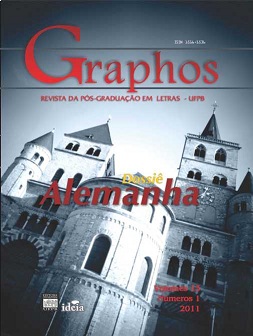O tempo presente, a soleira e os silêncios: contribuições e desafios na proposição de um modelo de crítica literária benjaminiano
Keywords:
Criticism, Present, Quarup, Time, PhilosophyAbstract
To do justice to Walter Benjamin’s thinking is undoubtedly merely possible in the consciousness of
the referential function of present time for the construction and interpretation of his most important
concepts and, most of all, for his critical methods. The present is hereby the messianic time, for by
privileging the time of the observer, by proceeding anachronically, it renews the comprehension of
the objects, the discourses, the reality, and inserts them in a multiple temporality caught in
permanent actualization. Epistemologically seen, this heightened position of present time leads to an
impasse, for how it is possible to do justice to a thinking that defines itself as expression of a
language and reflection caught in permanent actualization? To make reference to Benjamin today,
without adapting him to contemporary context in due measure, wouldn’t that mean to impose
indirectally the time of the author’s concepts and methods on the privileged time of the observer?
To do justice to Benjamin’s thinking therefore means to openly consider the paradox, latently
present, of appropriation of this philosophical heritage; it means to transcend the impasse by a
reception of this thinking that acts in accordance with it as method and expression. A reflection
about an eventual model of critique that remains true to the author’s thinking and at the same time
adapts to objects in diverse historical contexts and their theoretical implications is thus the objective
of this essay. Its parting point will be the dialogue between Benjamin’s concepts and methods and
the problematization of time and Brazil’s history in the novel Quarup by Antonio Callado. It will
end measuring the challenge it is to do justice to Benjamin’s works in the present.
Downloads
References
AGOSTINHO, Pedro. Kwarip: mito e ritual no Alto Xingu. São Paulo, EPU; USP, 1974.
ARAÚJO, Arturo Gouveia de. Literatura e repressão pós-64: o romance de Antonio Callado. João Pessoa, Idéia, 2006. (Coleção Carpe diem).
BENJAMIN, Walter. Gesammelte Schriften. Bd. V-1. Frankfurt am Main, Suhrkamp, 1989.
______, Gesammelte Schriften. Bd. I-1. Frankfurt am Main, Suhrkamp, 1981.
______, Gesammelte Schriften. Bd. IV-1. Frankfurt am Main, Suhrkamp, 1981a.
______, Gesammelte Schriften. Bd. II-1. Frankfurt am Main, Suhrkamp, 1977.
______, Ursprung des deutschen Trauerspiels. Frankfurt am Main, Suhrkamp, 1978.
BORGES, Jorge Luis. Obras Completas III. (Tradução Sérgio Molina) São Paulo, Globo, 2000.
CALLADO, Antonio. Quarup. Rio de Janeiro, Nova Fronteira, 1984.
VILLAS-BOAS, Orlando. A arte dos pajés. São Paulo, Globo, 2000.







